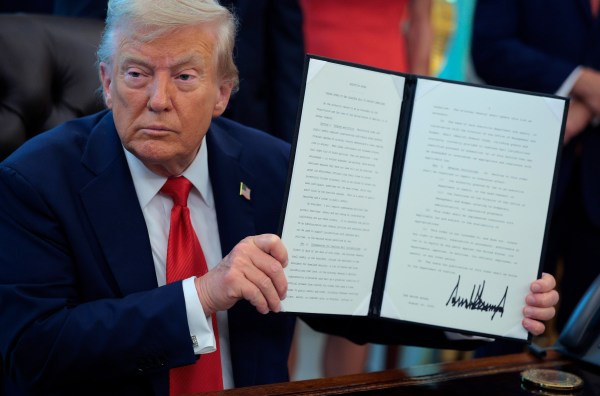Welcome to the latest in our series, “The Biden Agenda.” We've invited some of the smartest thinkers and subject-matter experts we know to contribute to what will become an occasional series on what a Biden presidency might look like. Today Jonathan Schanzer of the Foundation for Defense of Democracies weighs how Joe Biden might handle Middle East relations and whether he can take advantage of the willingness of some moderate Arab nations to normalize relations with Israel.

In October 2016, I attended an intimate discussion with a senior Israeli diplomat. Participants took turns peppering him with questions about security problems that plagued the Middle East. When it was my turn, I asked him, “What Israel-related challenges and opportunities await the next president?” His response was memorable: “We can always discuss challenges. But there will be a huge opportunity, no matter who is elected. The next president can broker peace between Israel and the moderate Sunni Arab states.”
Nearly four years later, the Trump administration helped broker the first such deal between the United Arab Emirates and Israel. Details are still being ironed out (notably, the UAE’s request for F-35 aircraft), but the UAE has already repealed its anti-Israel boycott law and warmly welcomed an Israeli delegation, delivered by Israel’s national carrier El-Al, with great fanfare. By all accounts, the deal is off to an auspicious start.
For the Trump administration, this was an important foreign policy win in the lead-up to the November election. And officials are quick to point out that this diplomatic success may not be one and done. All eyes are now on Bahrain, Oman, Sudan, Morocco, and perhaps other Arab states that are also mulling peace with Israel.
President Trump and his Republican party are already framing this diplomacy as proprietary. Admittedly, Arab-Israeli rapprochement was spurred on by mutual alarm over the Obama administration’s ill-fated 2015 nuclear deal that yielded Iran up to $150 billion in sanctions relief without permanently halting the Islamic Republic’s nuclear program. And the unorthodox approach of focusing on Arab states on the periphery of the Palestinian-Israeli conflict (rather than on the Palestinians) is undeniably an approach championed by Trump and his son-in-law Jared Kushner.
But as the Israeli diplomat noted in 2016, Hillary Clinton might have also cashed in on the ripening ties between moderate Sunni states and Israel. And there is certainly nothing that would preclude a future Biden administration from doing so.
To be sure, there may be some lingering suspicions among the Arab leaders, stemming from Biden’s role in the Obama administration’s much-maligned Iran policy. But with diplomatic dominoes set to fall, should Biden win in November, opportunities await.
What stands between Biden and such victories are two things: orthodoxy and personnel.
Orthodoxy may the easier of the two to surmount. Biden would have Trump to thank for that. Decades of Middle East diplomacy, conducted by Republican and Democratic presidents alike, have focused primarily on the demands of an irredentist clique of Palestinian leaders who consistently spurn American solutions to the Palestinian-Israeli conflict. American presidents have traditionally leaned on peripheral Arab states to help lean on the Palestinians and prod them back to the negotiating table—usually to no avail. We might call this the “inside-out” approach to peacemaking.
Trump (more accurately, Kushner) has done the opposite. The “outside-in” has proved to be viable. The Palestinians are now watching helplessly as regional states mull normalization with Israel. The Arab states are prioritizing their own national interests over the Palestinian cause for the first time in a century, depriving the Palestinians of leverage. Should this trend continue, the Palestinians may be forced to acquiesce to a deal that offers far less than they might hope. At minimum, they will need to give up the dream of the demise of Israel as a state in which the Jewish people enjoy sovereignty and self-determination. More practically, this means the Palestinians would have to compromise on core issues like borders, Jerusalem, and Palestinians claiming refugee status. Should Trump prevail in November, the Palestinians would be given little choice but to negotiate along the lines of the so-called Deal of the Century (also known as Peace to Prosperity) published by the White House earlier this year—a document that frontloads benefits for Israel and forces the Palestinians to get their political house in order.
Of course, Biden would never hew to the parameters of the Trump plan for obvious political reasons. But de-emphasizing Palestinian demands while playing to the national interests of peripheral Gulf states that are eager to normalize with Israel is a strategy Biden cannot easily ignore. Even if Trump manages to broker additional agreements in the coming months, more deals will likely be ripe for the picking next year.
But it may not be that simple. Should Biden be willing to eschew the diplomatic orthodoxy and try his hand at “outside-in” peacemaking, he may find resistance in his own ranks. For one, there is a relatively small but vociferous progressive strain within the Democratic party that views Saudi Arabia, the UAE, and their Sunni allies not as partners but as rogue states deserving of U.S. sanctions. This stems, in part, from a rather binary view of Iran that grew out of the heated debate over the 2015 Iran nuclear deal, during which Iran was erroneously described as a potential partner and not the state sponsor of terrorism that it is. The goal, from what we can tell, was to normalize ties with Iran while casting the Islamic Republic’s Arab foes as the real problem.
Advocates for the Iran nuclear deal hope to rise again in a future Biden administration. They seek nothing less than a full return to the 2015 accord. To put it mildly, this would seriously undermine America’s ability to broker peace deals between the Arabs and Israelis. Indeed, they are of the same mind when it comes to the Iranian threat. Ironically, such a move might push the Israelis and Arabs closer together out of a mutual distrust of the White House, as was the case with Obama. This would leave Washington on the sidelines of future Arab-Israeli peace deals.
As it happens, Iran nuclear deal advocates often overlap with a minority strain in the Democratic party that has an abiding sympathy for the Palestinian cause and a concurrent antipathy for Israeli. These are the figures that advocate for the economic warfare campaign known as Boycott, Divestment and Sanctions (BDS) targeting Israel, and inexplicably blame Israel for a conflict that was launched by its enemies a century ago, even as Israel has offered to end the conflict with territorial concessions on multiple occasions. Israel’s recent vacillation over the prospect of annexing roughly one-third of the West Bank further fueled those sentiments. Fortunately, the peace deal with the UAE appears to have taken that option off the table for now. In fact, that was the demand from Abu Dhabi, in exchange for peace. But the anti-Israel voices within the party can still be heard.
With figures from the far left demanding a greater voice at a political moment that has afforded them greater sway, the temptation could be great for a future President Biden to acquiesce to them. In practice, this would mean eschewing the outside-in approach in favor of appeasing the Islamic Republic of Iran and the kleptocratic Palestinians. But Biden’s foreign policy approach has been historically centric and pragmatic. It will be hard for Biden and his advisers (among whom are many like-minded centrists and pragmatists) to ignore the path that Trump has helped to forge.
It is worth noting here, of course, that the “outside-in” and “inside-out” approaches to peacemaking are not binary. Biden could pursue both strategies at once, in a bid to wield leverage with all the parties, as overlapping negotiations play out. This is a strategy that some in Israel have quietly advocated.
Admittedly, the Middle East feels very far from home right now. America’s focus will be on domestic challenges for the foreseeable future. And those challenges are many. But brokering Middle East peace will be on the agenda of the next president. It is, after all, one way American presidents make history, and perhaps even win Nobel Prizes.
The Nobel committee has, in fact, just acknowledged Donald Trump for his recent success. The president has cashed in on the opportunities that his predecessor gifted him. Biden surely knows that he can do the same. ”Outside-in” diplomacy beckons.
Previous articles from “The Biden Agenda”:
Jonathan Schanzer, a former terrorism finance analyst at the United States Department of the Treasury, is senior vice president for research at Foundation for Defense of Democracies, a nonpartisan think tank in Washington, D.C. Follow him on twitter @JSchanzer.
Photograph by Israel Airports/Sivan Farag/Anadolu Agency/Getty Images.






Please note that we at The Dispatch hold ourselves, our work, and our commenters to a higher standard than other places on the internet. We welcome comments that foster genuine debate or discussion—including comments critical of us or our work—but responses that include ad hominem attacks on fellow Dispatch members or are intended to stoke fear and anger may be moderated.
With your membership, you only have the ability to comment on The Morning Dispatch articles. Consider upgrading to join the conversation everywhere.